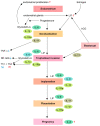Molecular Determinants of Uterine Receptivity: Comparison of Successful Implantation, Recurrent Miscarriage, and Recurrent Implantation Failure
- PMID: 38139443
- PMCID: PMC10743587
- DOI: 10.3390/ijms242417616
Molecular Determinants of Uterine Receptivity: Comparison of Successful Implantation, Recurrent Miscarriage, and Recurrent Implantation Failure
Abstract
Embryo implantation is one of the most remarkable phenomena in human reproduction and is not yet fully understood. Proper endometrial function as well as a dynamic interaction between the endometrium itself and the blastocyst-the so-called embryo-maternal dialog-are necessary for successful implantation. Several physiological and molecular processes are involved in the success of implantation. This review describes estrogen, progesterone and their receptors, as well as the role of the cytokines interleukin (IL)-6, IL-8, leukemia inhibitory factor (LIF), IL-11, IL-1, and the glycoprotein glycodelin in successful implantation, in cases of recurrent implantation failure (RIF) and in cases of recurrent pregnancy loss (RPL). Are there differences at the molecular level underlying RIF or RPL? Since implantation has already taken place in the case of RPL, it is conceivable that different molecular biological baseline situations underlie the respective problems.
Keywords: cytokines; implantation; recurrent implantation failure; recurrent pregnancy loss; uterine receptivity.
Conflict of interest statement
The authors declare no conflict of interest.
Figures

References
-
- D’Occhio M.J., Campanile G., Zicarelli L., Visintin J.A., Baruselli P.S. Adhesion molecules in gamete transport, fertilization, early embryonic development, and implantation-role in establishing a pregnancy in cattle: A review. Mol. Reprod. Dev. 2020;87:206–222. doi: 10.1002/mrd.23312. - DOI - PubMed
Publication types
MeSH terms
Substances
LinkOut - more resources
Full Text Sources

